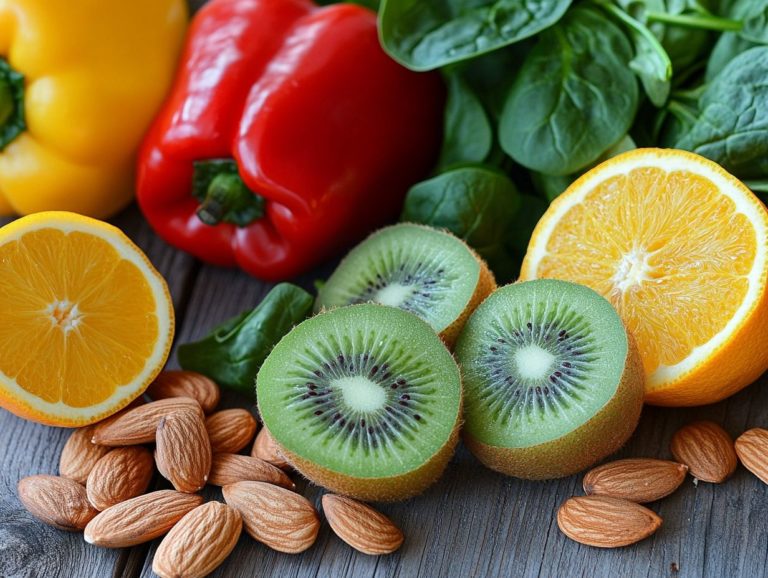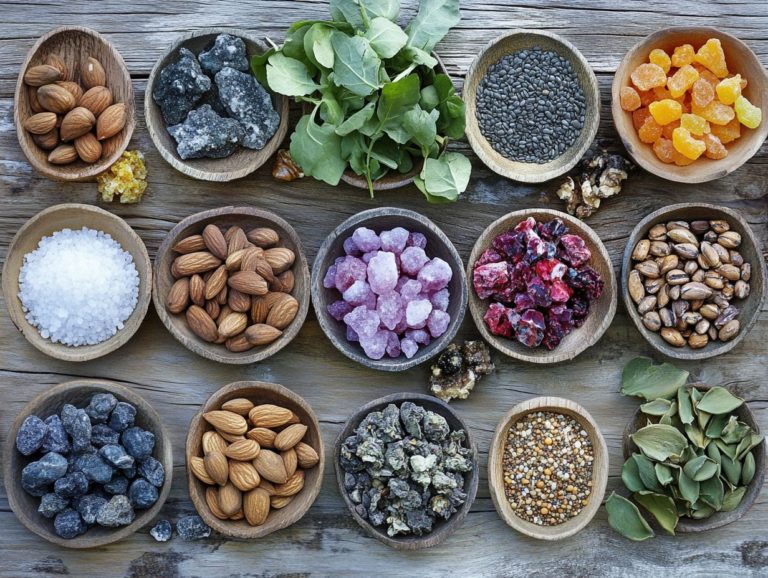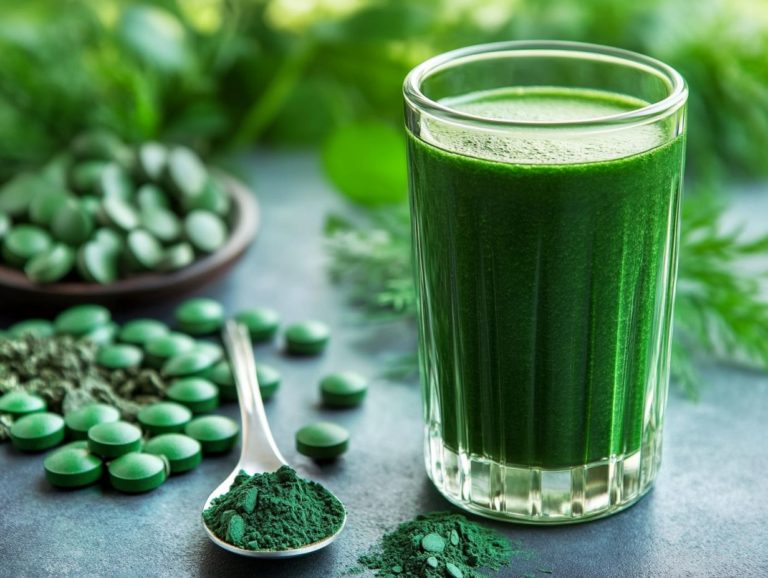Top 7 Herbs for Natural Stress Relief
In today s fast-paced world, stress often feels like an unwelcome companion, lurking around every corner. Fortunately, nature provides a treasure trove of herbs celebrated for their calming properties.
Discover these seven powerful herbs that can quickly help you soothe your mind and body. Don’t wait start your journey to tranquility today!
This article delves into seven powerful herbs Lavender, Ashwagandha, Rhodiola, Chamomile, Lemon Balm, Passionflower, and Valerian Root that can help you soothe both mind and body.
You ll also uncover what stress truly is, its effects on your body, the myriad benefits of using these herbs, and how to effortlessly weave them into your daily routine for lasting relief.
Contents
- Key Takeaways:
- 1. Lavender
- 2. Ashwagandha
- 3. Rhodiola
- 4. Chamomile
- 5. Lemon Balm
- 6. Passionflower
- 7. Valerian Root
- What Is Stress and How Does It Affect the Body?
- What Are the Benefits of Using Herbs for Stress Relief?
- How Can These Herbs Be Used for Stress Relief?
- Are There Any Side Effects of Using These Herbs?
- Can These Herbs Be Used in Conjunction with Other Treatments?
- How Can One Incorporate These Herbs into Their Daily Routine?
- What Are Some Additional Tips for Managing Stress Naturally?
- Frequently Asked Questions
- 1. What are the top 7 herbs for natural stress relief?
- 2. How does ashwagandha help with stress relief?
- 3. Is lavender effective for stress relief?
- 4. What is the best way to use chamomile for stress relief?
- 5. Can passionflower be used for long-term stress relief?
- 6. Is it safe to use kava for stress relief?
Key Takeaways:
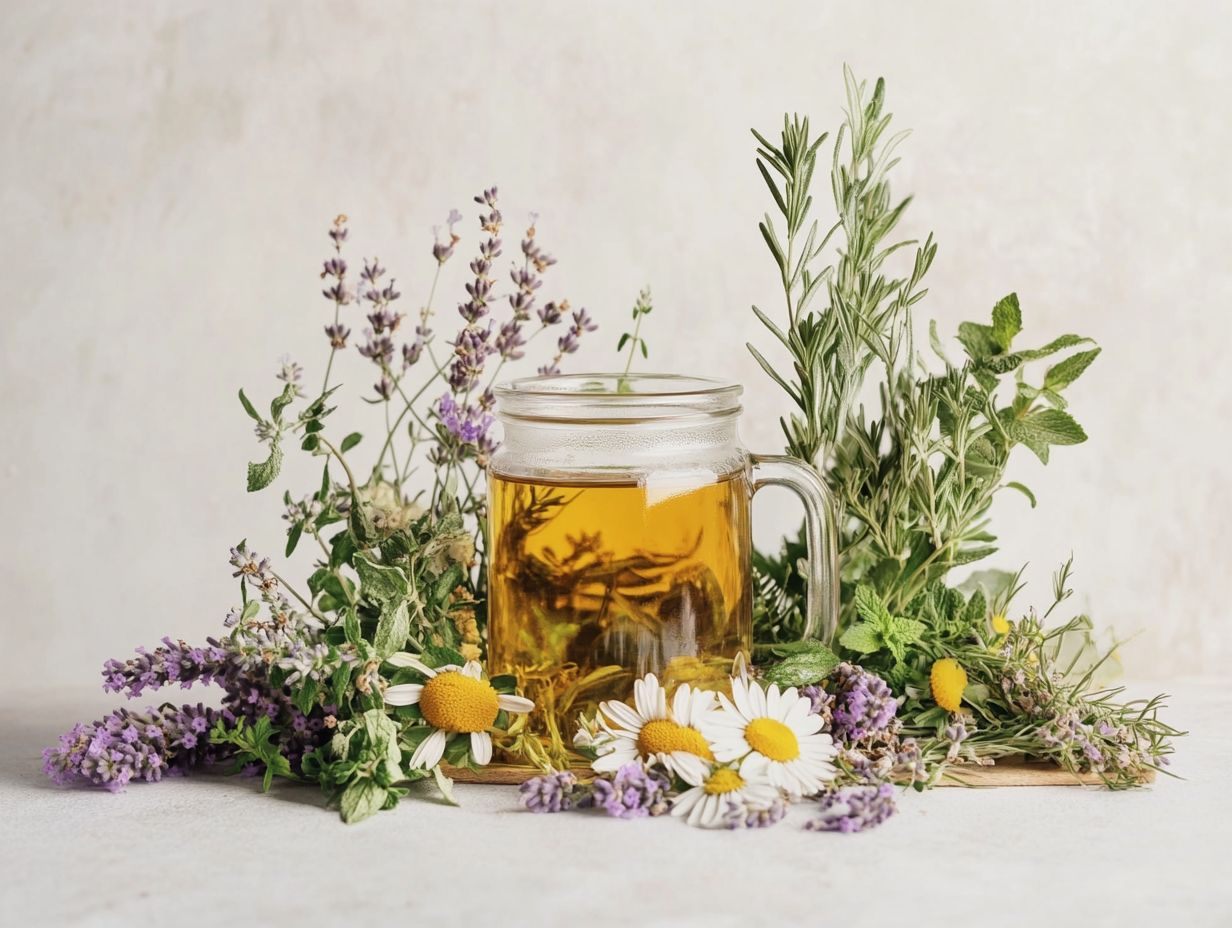
Stress is a common issue that affects the body negatively.
Using herbs for stress relief has numerous benefits, including promoting relaxation and reducing tension.
Herbs like lavender, ashwagandha, and rhodiola can be consumed in various forms, such as tea or supplements, for stress relief.
1. Lavender
Lavender, renowned for its calming properties, stands as a formidable herbal remedy for managing stress and anxiety. Its soothing aroma and therapeutic benefits contribute significantly to your mental health and emotional well-being.
This versatile herb is not just a star in the essential oils department, which you can diffuse in the air or relax in during a bath; it also shines in its dried form, perfect for teas or sachets.
When woven into your relaxation techniques, lavender elevates practices like aromatherapy, where inhaling its scent envelops you in tranquility, or meditation, where it aids in clearing your mind.
Integrating lavender into your deep breathing exercises can enhance its calming effects. This makes it easier for you to unwind after a long day and paves the way for a restful night s sleep.
2. Ashwagandha
Ashwagandha, a revered adaptogenic herb in Ayurveda, holds a distinguished place for its remarkable ability to counter the effects of chronic stress and anxiety, significantly enhancing your emotional health and overall well-being.
This extraordinary herb works by modulating cortisol levels, often dubbed the stress hormone. Its adaptogenic properties enable you to maintain a balanced response to stressors.
Clinical studies show ashwagandha s benefits, revealing that it not only reduces anxiety and stress levels but also enhances sleep quality and cognitive function.
It’s wise for you to consult healthcare professionals before incorporating ashwagandha into your routine, especially if you’re on medications. This herb may interact with certain prescriptions, such as sedatives or thyroid medications.
Engaging in a discussion about potential side effects and your individual health circumstances is crucial for ensuring safe and effective use.
3. Rhodiola
Rhodiola, a remarkable adaptogen, enhances your mental focus while bolstering your body’s natural resilience to stress. This can significantly reduce your risk of stress-related conditions, including cardiovascular diseases.
It works its magic by modulating neurotransmitters like serotonin and dopamine, both of which are essential for mood regulation and cognitive function.
You ll find various preparations of Rhodiola standardized extracts, capsules, and teas offering you the flexibility to choose the method of consumption that fits your lifestyle best.
Generally, the recommended daily dosage ranges from 200 to 600 mg, but it s crucial to consult with a healthcare provider to receive personalized guidance tailored to your needs.
To assess its effectiveness, you can monitor changes in your mood, stress levels, and anxiety over time, taking note of any improvements in your daily functioning and overall well-being.
4. Chamomile
Chamomile, renowned for its soothing effects, serves as a natural herbal remedy that not only promotes relaxation and alleviates insomnia but also addresses various gastrointestinal concerns, enhancing your overall well-being.
Its calming properties make chamomile an ideal choice if you re looking for a gentle way to improve your sleep quality and reduce stress, often savored in the form of aromatic teas or concentrated extracts.
This versatile herb is frequently incorporated into holistic practices designed to foster mental clarity and emotional balance.
While chamomile is generally safe, it’s wise to be aware that it can interact with certain medications. Consulting a healthcare provider before use ensures that you can enjoy the many benefits of chamomile safely and effectively.
5. Lemon Balm
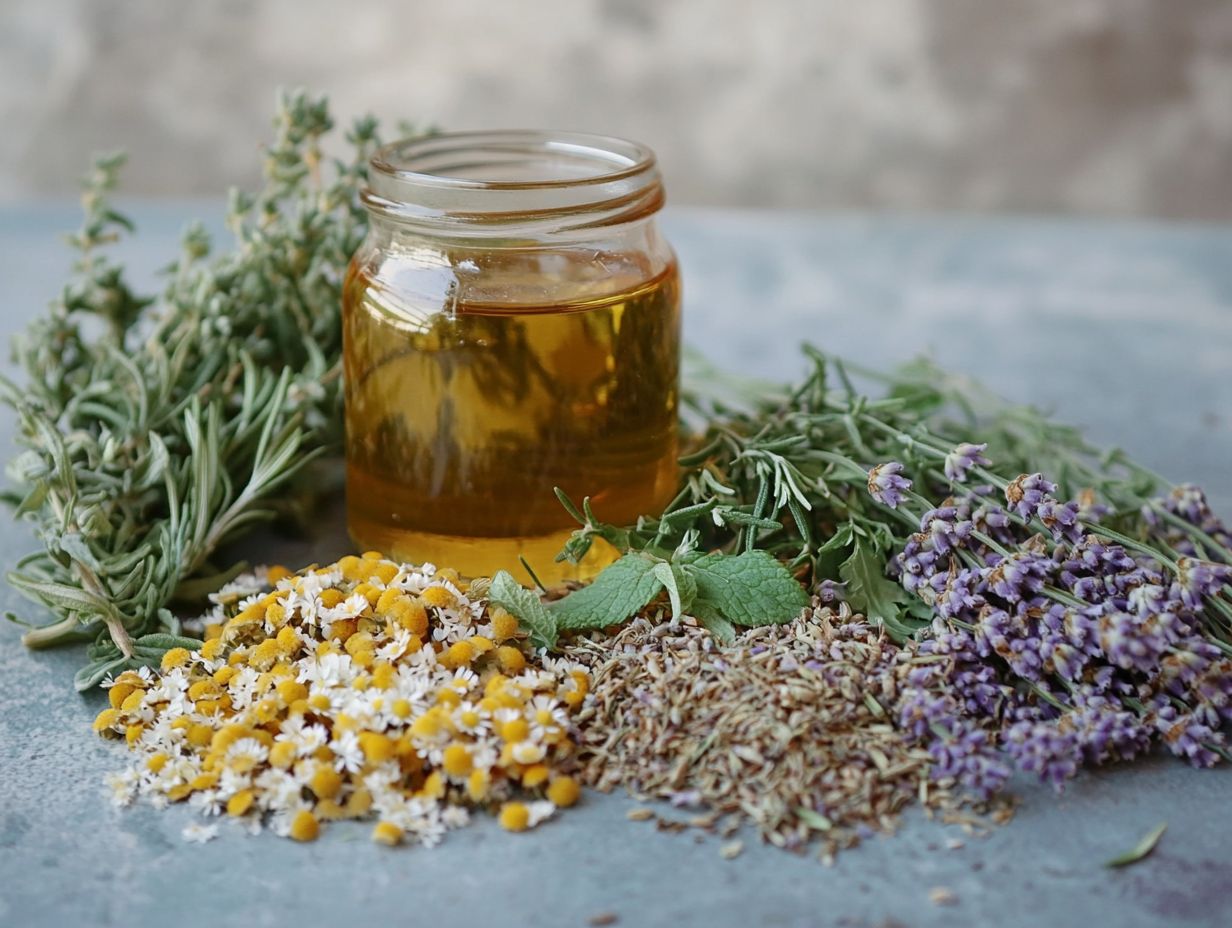
Lemon balm is back in the spotlight, and for good reason! This gentle anti-anxiety herb is your go-to ally in the quest for emotional balance. Frequently found in herbal supplements, it works to alleviate stress and anxiety, positively impacting your mental health.
This beloved herb has made a remarkable comeback, thanks to its soothing properties, establishing itself as a staple in many daily routines.
Try incorporating lemon balm into your diet today for a flavorful way to unwind! Brewing it as a calming tea offers not only a delightful flavor but also helps you relax after a long day.
If you’re looking for something more concentrated, a tincture can easily fit into your busy lifestyle, offering you a powerful dose without the fuss.
What sets lemon balm apart from other herbal remedies like chamomile or valerian root is its milder yet effective approach to managing anxiety. This makes it an appealing choice for anyone seeking a gentle and accessible form of stress relief.
6. Passionflower
Passionflower stands out as an esteemed herbal remedy celebrated for its calming effects, particularly invaluable in addressing insomnia and anxiety. It s no wonder that this vibrant plant has become a favorite among those seeking natural relaxation techniques.
With a rich history, passionflower has been embraced by indigenous cultures for centuries, serving to alleviate nervous tension and foster tranquility. In today s wellness landscape, many individuals find it particularly effective when woven into their evening rituals, whether as a soothing tea or a calming tincture.
Consider how passionflower may interact with other medications, as it can amplify the effects of sedatives and antidepressants. Consulting a healthcare professional before incorporating passionflower into your routine is not just wise, but essential, ensuring a safe and effective path to achieving serenity.
7. Valerian Root
Valerian root is a highly esteemed herbal supplement known for its sedative properties that promote relaxation and alleviate insomnia, thus nurturing a healthy nervous system.
This herbal remedy works by increasing gamma-aminobutyric acid (GABA), a chemical in your brain that helps calm your nerves and fosters a sense of tranquility.
You can conveniently find valerian root in various forms, including teas, capsules, and tinctures, giving you the flexibility to choose what suits your preferences best.
For optimal results, a typical dosage ranges from 300 to 600 mg, taken 30 minutes to two hours before bedtime.
However, it’s important to be mindful of potential safety concerns; long-term use may lead to dependency. Consulting with a healthcare professional before starting, especially if you re on other medications, is a prudent step to ensure your well-being.
What Is Stress and How Does It Affect the Body?
Stress is a natural response your body has to challenging situations, but when it becomes chronic, it can lead to significant health issues that affect your mental health and emotional well-being through altered stress responses and physiological changes.
When exploring stress, it s crucial to distinguish between acute and chronic forms. Acute stress is usually a short-term reaction to immediate challenges, like an impending deadline or a sudden scare. In contrast, chronic stress lingers over time, often stemming from ongoing issues such as workplace pressures or personal struggles.
From a physiological perspective, stress triggers the release of hormones like cortisol, which can overwhelm your nervous system and disrupt various bodily functions. This disruption can place a strain on your cardiovascular system, increasing heart rate and blood pressure, while gastrointestinal issues, such as irritable bowel syndrome, may emerge.
These prolonged effects not only take a toll on your physical health but also have significant repercussions for your emotional stability and mental clarity, ultimately shaping the overall quality of your life.
What Are the Benefits of Using Herbs for Stress Relief?
Utilizing herbs for anxiety and stress relief presents a wealth of health benefits, including reduced anxiety levels and improved sleep quality. These attributes make herbs a fantastic part of your health routine.
Incorporating herbs like chamomile, known for its calming effects, and lavender, which may elevate your mood, can significantly boost your mental well-being. Ashwagandha and rhodiola are celebrated for their adaptogenic properties, helping your body manage stress more effectively.
These herbal supplements are now popular in modern wellness circles, seamlessly integrating with traditional relaxation techniques like meditation and yoga. This combination creates a more comprehensive approach to keeping your mind healthy.
By reconnecting with nature s remedies, you can unlock a new level of peace and balance in your life!
How Can These Herbs Be Used for Stress Relief?
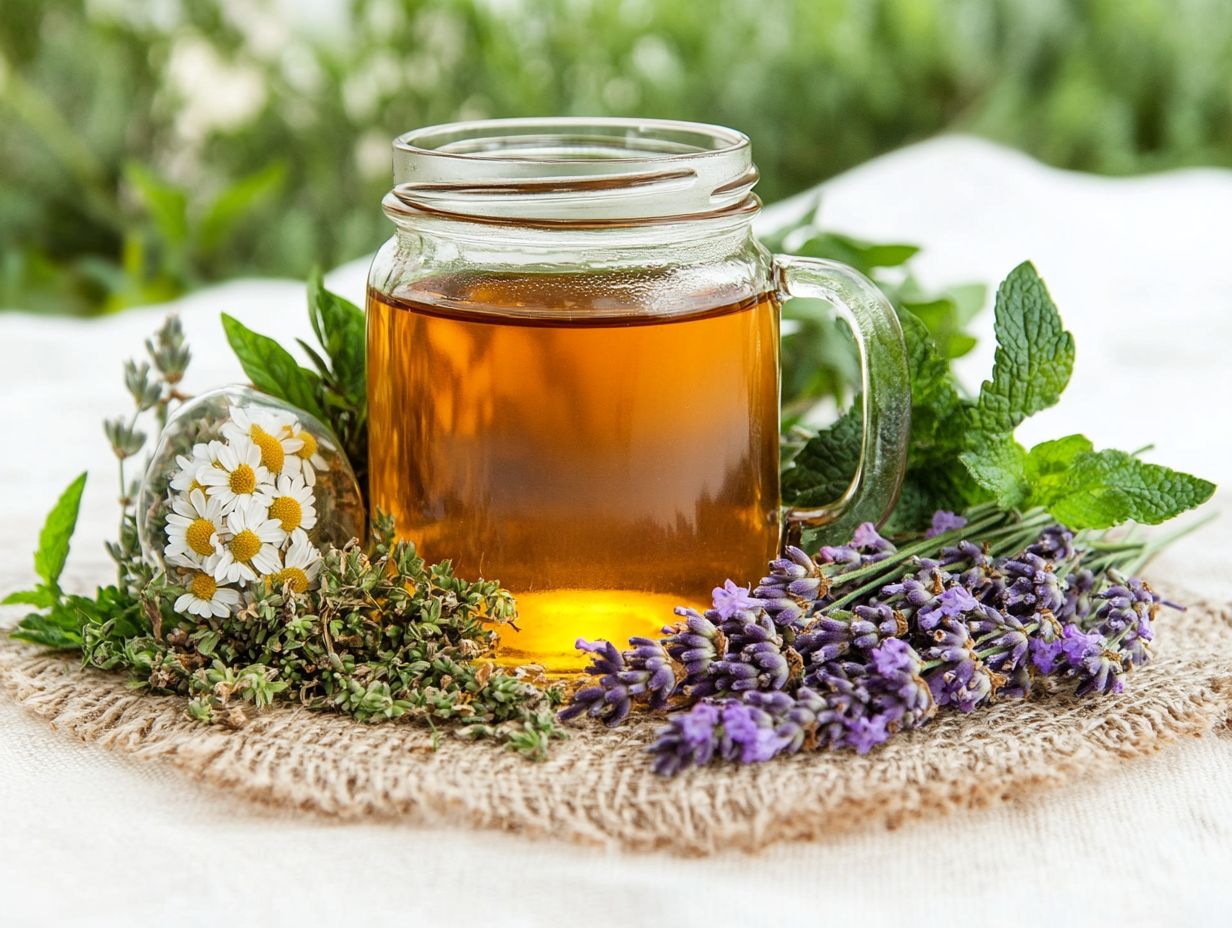
You can use these herbs in many ways for stress relief. Try teas, tinctures, capsules, or essential oils, each uniquely enhancing your emotional health and promoting relaxation.
To seamlessly integrate these options into your daily routine, start with herbal teas. They can be enjoyed both in the morning and as a calming ritual before bedtime.
A common recommendation is to steep one teaspoon of dried herb in hot water for about 10 minutes, allowing the beneficial compounds to infuse the liquid.
For tinctures, just a few drops can be added to water or taken directly, depending on the herb’s potency. It’s essential to follow the recommended dosages usually indicated on the packaging and to be mindful of your personal tolerance.
Investing in high-quality supplements is crucial. Rigorously tested products guarantee potency and safety, helping you fully harness the effectiveness of these herbal remedies.
Are There Any Side Effects of Using These Herbs?
Herbal remedies can seem safe, but be aware of possible side effects and safety concerns that can arise. These can vary based on your unique health conditions.
Engaging in a conversation with a healthcare professional is essential. Take St. John’s Wort, for example; this herb might seem like a natural pick-me-up, but it can interact negatively with antidepressants, diminishing their effectiveness.
Similarly, ginkgo biloba, commonly used to boost memory, could raise your bleeding risk if you’re on blood-thinning medications. Staying informed about these interactions is crucial, particularly if you have pre-existing health issues or are currently taking medication.
Therefore, talk to your healthcare provider before trying any herbs to stay safe!
Can These Herbs Be Used in Conjunction with Other Treatments?
Using herbal remedies alongside clinical treatments can be helpful, but you must be careful. Consult with a healthcare professional to ensure both safety and efficacy.
Many individuals, in their pursuit of enhanced wellness, explore the synergy between these two methods, believing that herbal supplements can complement traditional therapy. However, it’s crucial to understand that not all herbs are safe or effective with conventional treatments; some may even interact negatively with your prescribed medications.
Maintaining open communication with your healthcare provider is essential when looking into herbal usage. They can provide invaluable insights into potential risks and necessary adjustments to your treatment plan.
By fostering this dialogue, you enable yourself to make informed choices and reap the benefits of both worlds while prioritizing your health and well-being.
How Can One Incorporate These Herbs into Their Daily Routine?
Incorporating herbal remedies into your daily routine can significantly enhance your emotional health and overall well-being. Simple practices, such as adding herbal teas to your diet or utilizing essential oils for aromatherapy, can make a remarkable difference.
To elevate this experience, consider scheduling dedicated tea times throughout your day. This allows you a moment for mindfulness and relaxation that can be truly restorative. Creating calming rituals like lighting a lavender-scented candle while savoring chamomile tea helps to establish a serene atmosphere that nurtures your spirit.
Regularly using herbal supplements, alongside a balanced diet and consistent physical activity, can profoundly support your stress management efforts. The synergy between nutrition and herbs complements an active lifestyle, fostering resilience in the face of challenges.
By making these herbal practices a habitual part of your daily life, you ll discover a deeper connection to your well-being, paving the way for a more peaceful state of mind.
What Are Some Additional Tips for Managing Stress Naturally?
Herbal remedies can be part of a natural stress management strategy, which also involves embracing relaxation techniques, physical activity, and mindfulness practices like meditation. These contribute to a healthier lifestyle and emotional equilibrium.
It’s vital to adopt a holistic approach that extends beyond these methods, paying close attention to nutrition, sleep hygiene, and emotional growth.
Proper nutrition equips your body with essential nutrients that bolster brain health, while a consistent sleep routine enhances your restorative processes, allowing you to recharge effectively.
Nurturing emotional resilience through personal development and self-reflection can lead to profound growth.
By weaving together these various techniques, you not only confront stress head-on but also cultivate a more balanced and fulfilling life, enabling yourself to tackle challenges with a refreshed perspective.
Frequently Asked Questions
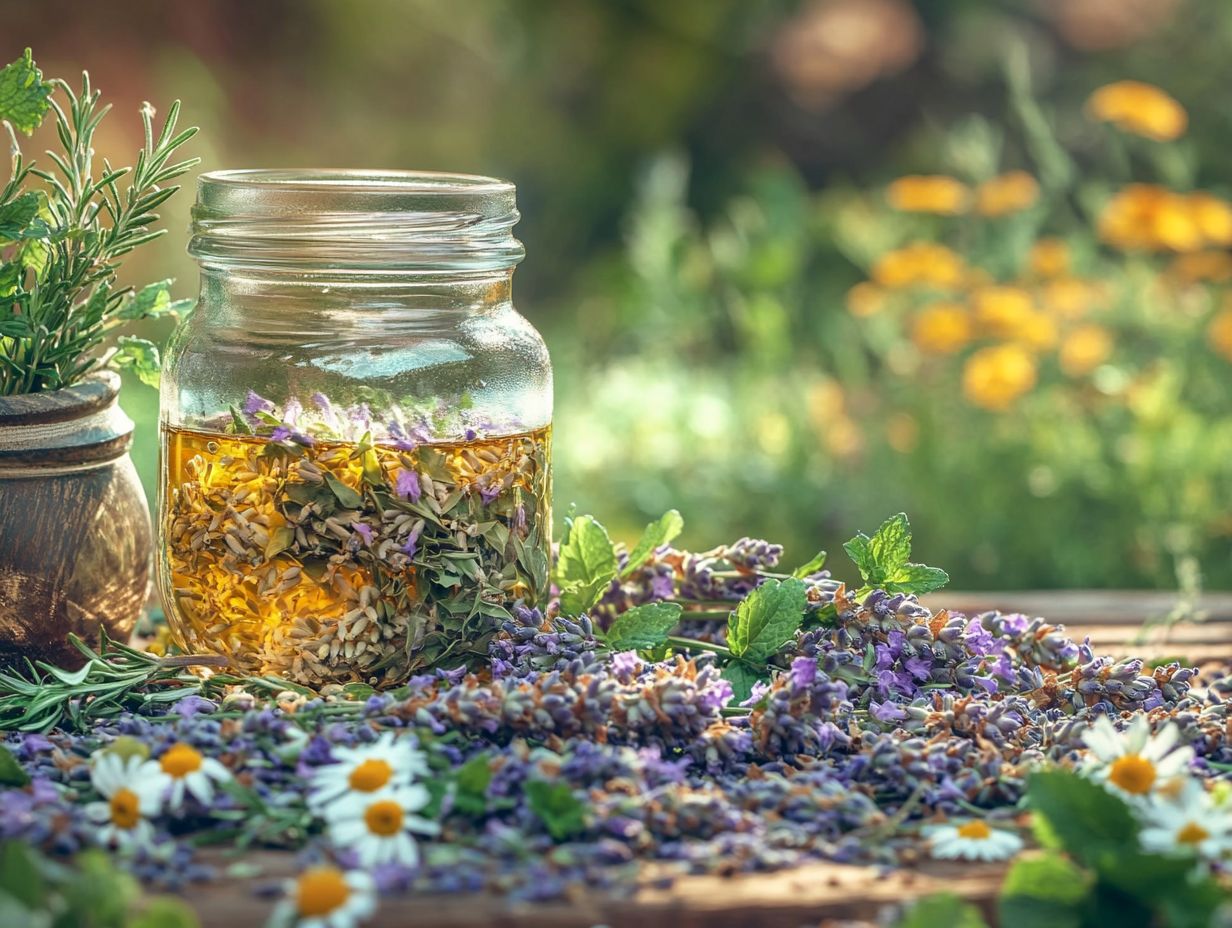
1. What are the top 7 herbs for natural stress relief?
The top 7 herbs for natural stress relief are ashwagandha, lavender, chamomile, passionflower, lemon balm, valerian root, and kava.
2. How does ashwagandha help with stress relief?
Ashwagandha is a type of herb that helps your body manage stress and regulate cortisol levels, reducing stress and anxiety.
3. Is lavender effective for stress relief?
Yes, lavender has been shown to have a calming effect on the nervous system, reducing stress and promoting relaxation.
4. What is the best way to use chamomile for stress relief?
Chamomile can be consumed as a tea, taken in supplement form, or used topically in essential oils to promote relaxation and reduce stress.
5. Can passionflower be used for long-term stress relief?
Yes, passionflower has been shown to be effective for long-term stress relief and can be safely used over an extended period of time.
6. Is it safe to use kava for stress relief?
Kava has been used for centuries as a natural remedy for stress and anxiety. However, it is important to consult a healthcare professional before using it, as it may interact with certain medications.




